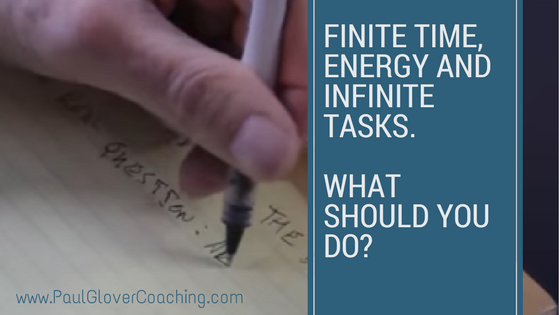
16 Feb Finite Time, Energy and Infinite Tasks. What Should you Do?
QUESTION:
When you have finite time and energy–along with infinite tasks–what should you do?
ANSWER:
You need to reduce your daily, weekly, monthly “to do list” — the “infinite number of tasks” that will never get smaller even if you worked 24/7 (which some of you are trying to do!) — to a “need to do list”.
You need to stop it already.
And if you need any motivation to stop unreasonably overworking yourself, read the P.S. at the end of this article.
The “need to do list” is comprised only of the essential items you must be focused on to fulfill your mission. You can determine the items that should go on your “need to do list” by considering the Opportunity Cost of each item.
Opportunity Cost refers to a benefit that a person could have received, but gave up, to take another course of action.
By considering the Opportunity Cost of each item on your “to do list” against the “need to do list”, you begin to realize the value of using your finite time and energy to create the proverbial “biggest bang for the buck” by only doing those items on the “need to do list.”
This means you have to be willing to say “NO” to tasks that aren’t on your “need to do list”.
You need to delegate tasks on your “to do list” to others on the Team – even if they won’t do it as well as you can.
For example: if someone on your team can arrange the logistics for a meeting, let them do it while you concentrate on the meeting’s content!
And …stop continuing to do things that are NOT on your “need to do list” just because you like to do them!
BTW: I’m not an idiot!
I realize that the Boss often attempts to put stuff on your “to do list.” But the key to not allowing the Boss that option, is to say no indirectly instead of directly.
Here’s how: point out the Opportunity Cost of you not being able to do an item that is on your “need to do list” because of his/her request.
Most Bosses will then be smart enough to find someone else to do their grunt work, since they too are operating on the basis of Opportunity Cost as they plan their work life.
The Bottom Line:
You have a finite amount of time and energy. Once those resources are used you cannot recover them, so use them for maximum impact.
P.S. The Japanese word Karōshi means “overwork death”. As revealed in this story, Karoshi is not an uncommon occurrence in Japan.


No Comments